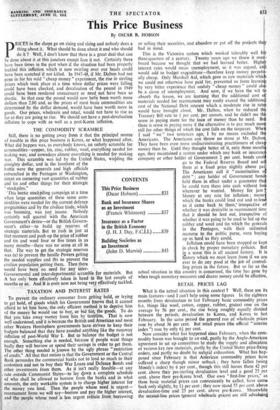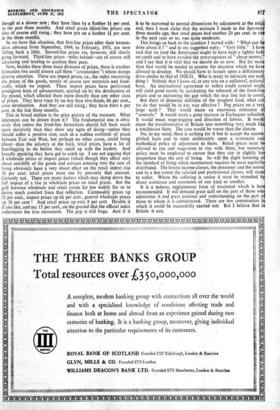This Price Business
By OSCAR R. HOBSON
PRICES in the shops go on rising and rising and nobody does a thing about it. What should be done about it and who should do it ? Well, I don't know that there is a great deal-that can be done about it at this juncture except face it out. Certainly there have been times in the past when if the situation had been properly tackled this inflation which is now swirling over our heads could have been scotched if not killed. In 1947-48, if Mr. Dalton had not gone in for his wild " cheap money " experiment, the rise in sterling prices which took place at a time when dollar prices were falling could have been checked, and devaluation of the pound in 1949 could have been rendered unnecessary or need not have been so drastic. In that case the pound would now hate been worth more dollars than 180 and. as the prices of most basic commodities are
determined by the dollar demand, would have been worth more in goods. Our prices, wholesale and retail, would not have to rise as far as they are going to rise. We should not have a post-devaluation inflation to cope with as well as a post-Korea inflation.
THE COMMODITY SCRAMBLE Still, there is no getting away from it that the principal source of trouble in this price business is Korea, or what happened after. What did happen was, as everybody knows, an unholy scramble for commodities—copper, tin, zinc, rubber, wool, everything needed for making war, and nowadays almost everything is needed for making war. This scramble was led by the United States, wielding the almighty dollar, and in the forefront of the battle were the generals and high officials entrenched in the Pentagon at Washington, intent on cornering vast quantities of rubber and tin and other things for their strategic " stockpiles."
This hectic stockpiling campaign at a time when large quantities of these same com- modities were needed for the current defence programmes and by the civilian trade, which was booming, was just insane. Nobody certainly will quarrel with the. American Government's desire—or the British Govern- ment's either—to build up reserves of strategic materials. But to rush in just at that moment and push up the price of rubber and tin and wool four or five times in as many months—there was no sense at all in that. The way to get the strategic reserves was (a) to prevent the hostile Powers getting the needed supplies and (b) to prevent the civilian population_ getting them. Then there would have been' no need for any inter- Governmental and inter-departmental scramble for materials. But A has only been effectively taken in hand in the last couple of months or so. And B is even now not being very effectively tackled.
TAXATION- AND INTEREST RATES
or selling their securities, and abandon or put off the projects th had in mind.
This is the Victorian system which worked tolerably well f three-quarters of a century. Twenty years ago we threw it ove board because we thought that we had learned better. His interest rates would mean unemployment, so it was argued, a would add to budget expenditure—therefore keep money perpet ally cheap. Only Marshall Aid, which gave us raw materials whi we could not otherwise have paid for, prevented us from learnin by very bitter experience that unduly " cheap money " could al be a cause of unemployment. And now, if we have the wit absorb the lesson, we arc learning that the additional cost materials needed for rearmament may easily exceed the addition: cost of the National Debt interest which a moderate rise in rat would have brought about. Mr. Dalton, when he reduced th Treasury Bill rate to per cent. per annum, said he didn't see th$ sense in paying more for the loan of money than he need. Buk there is sense in paying more if the alternative is to pay much mor still for other things of which the cost falls on the taxpayer. Whe I said " we " two sentences ago, I by no means excluded th Americans. The Americans can throw no stone at Mr. Dalto They have been even more undiscriminating practitioners of chea money than he. Until they thought better of it, only three mont
ago, they maintained a system under which any bank or insuranc company or other holder of Government 2 per cent. bonds coul go to the Federal Reserve Board and se
them at a fixed price slightly above pa The Americans call it " monetisation debt " ; any holder of Government bond held them in effect under a guarantee t he could turn them into cash without I whenever he wanted. Money for jam Money at any rate for inflation ; mone which the banks could lend out and re-lc as it came back to them,' irrespective of whether it was desirable in rearmament time that it should be lent out, irrespective of whether it was going to be used to bid up the rubber and wool and tin which the generals in the Pentagon, with their unlimited .recourse to the public purse, were buying up as hard as they could.
Inflation could have been stopped or kept in check by proper monetary policies. But in a sense this is all ancient history. It is history which we must learn from if we aro ever to do any good at the job of control- ling prices in the future. But so far as the actual situation in this country is concerned, the time has gone by when tough monetary measures and dearer money could be effective.
RETAIL PRICES LAG What is the actual situation in this context ? Well, these are its though at a slower rate ; they have risen by a further 1 per cent. in the past three months. And retail prices (third-line prices) are also Of course still rising ; they have put on a further 11 per cent. in the three months.
So we have this situation, that first-line prices after their tremen- dous advance from September, 1949, to February, 1951, are now falling back a little. Second-line prices are, however, still slowly going forward. Third-line prices—miles behind—are of course still advancing and tending to quicken their pace. Now, besides these three main divisions of prices, there is another formation (we could almost call them " commandos") whose doings deserve attention. These are import prices, i.e., the index measuring the prices of the goods, mostly of course raw materials and food- stuffs, which we import. These import prices have performed prodigiout feats of advancement, spurred on by the devaluation of the pound, which affected them more directly than any other class of prices. They have risen by no less than two-thirds, 66 per cent., since devaluation. And they are still rising ; they have risen 6 per cent, in the last three months.
This in broad outline is the price picture of the moment. What inferences can be drawn from it ? The fundamental one is obvi- ously that unless the front-l4ie formations should fall back much more decisively than they show any signs of doing—unless they should suffer a positive rout, such as a sudden outbreak of peace between East and West, but perhaps no other cause, could bring about—then the infantry at the back, retail prices, have a lot of footslogging to do before they catch up with the leaders. And broadly speaking they have got to catch up. I am not arguing that if wholesale prices or import prices (which though they affect only about one-fifth of the goods and services entering into the cost of living obviously have a very direct effect on the retail index) rise 10 per cent. retail prices must rise by precisely that amount. Certainly not. There are many factors which may damp down the full impact of a rise in wholesale prices on retail prices. But the gulf between wholesale and retail yawns far too widely for us to derive much comfort from that reflection. Commodity prices. up 55 per cent., import prices up 66 per cent., general wholesale prices up 38 per cent ! And retail prices up only 8 per cent. Double it if you like, and say 15 per cent., on the ground that the official index understates the true movement. The gap is still huge. And if it
is to be narrowed to normal dimensions by adjustment at the reta end, then I must claim that the estimate I made in the Spertard three months ago, that retail prices had another 20 per cent. to ri in the next year or so, was quite moderate. This brings us back to the question I started with: " What can done about it ? " and to my suggested reply: " Very little." I ha said that we (and the Americans) ought to have kept a tighter ho on credit and to have avoided the extravagances of " cheap money, and I say that it is vital that we should do so now. But far moi than that would be needed to reverse the situation which we ha allowed to develop. We should have to launch upon a deflationa drive similar to that of 1920-21. Who is ready to advocate any su thing ? Nobody that I know of, at any rate on a unilateral, nation basis. An international agreement to stiffen credit control migh still yield good results by quickening the rebound of the front-li prices and so narrowing the gap which the rear line has to cove But short of domestic deflation of the toughest kind, what c we do that would be in any way effective ? Peg prices on a ve large scale ? That would mean an enormous extension " controls." It would mean a great increase in Exchequer subsidi It would mean wage-pegging and direction of labour. It wou mean the transformation of Britain into something very much li a totalitarian State. The cure would be worse than the disease
No, to my mind, there is nothing for it but to accept the acco plished facts and to enter deliberately upon a systematic a methodical policy of adjustment to them. Retail prices must allowed to rise and wage-rates to rise with them, but moneta policy must be employed to ensure that they rise in slightly le proportion than the cost of living. So will the slight lowering the standard of living which rearmament requires be most equitab distributed. The lowest income-classes, the pensioner and the rentie and to a less extent the salaried and professional classes, will sta to suffer. Where the suffering is undue it must be remedied b direct assistance and easements of one kind or another.
It is a tedious, unglamorous form of treatment which is he recommended. It will demand great skill on the part of those w administer it and great patience and understanding on the part o those to whom it is administered. There are few communities which it could be successfully carried out. But I believe that 1 Britain it can.



















































 Previous page
Previous page